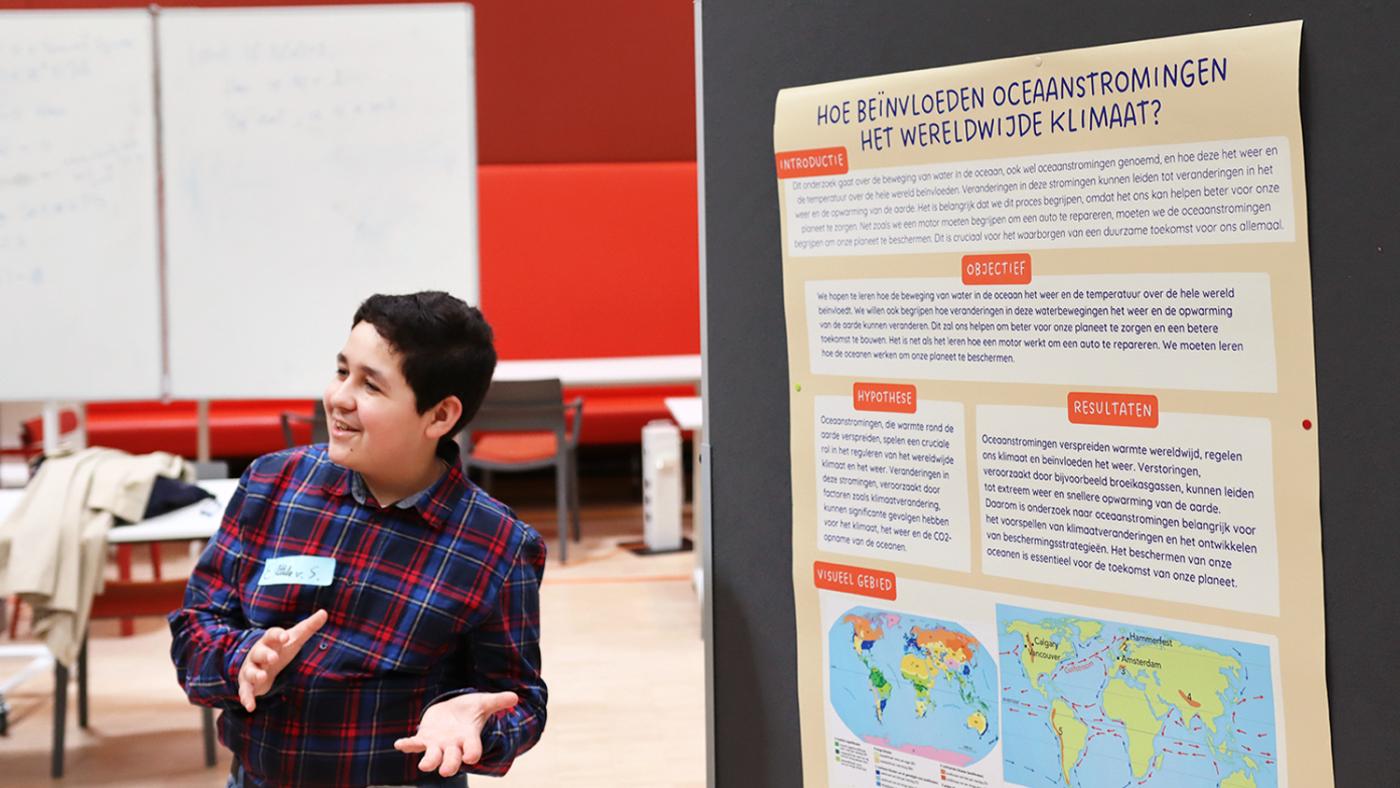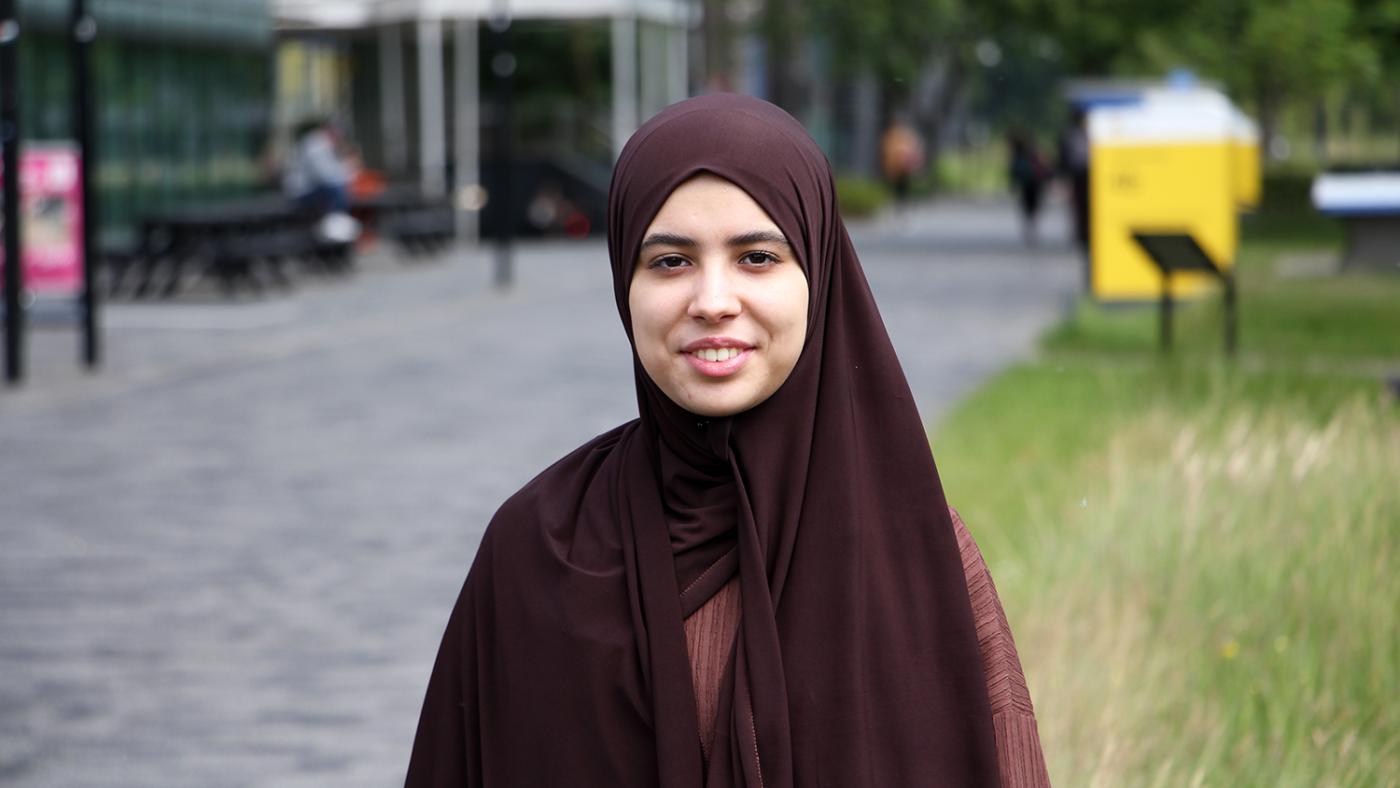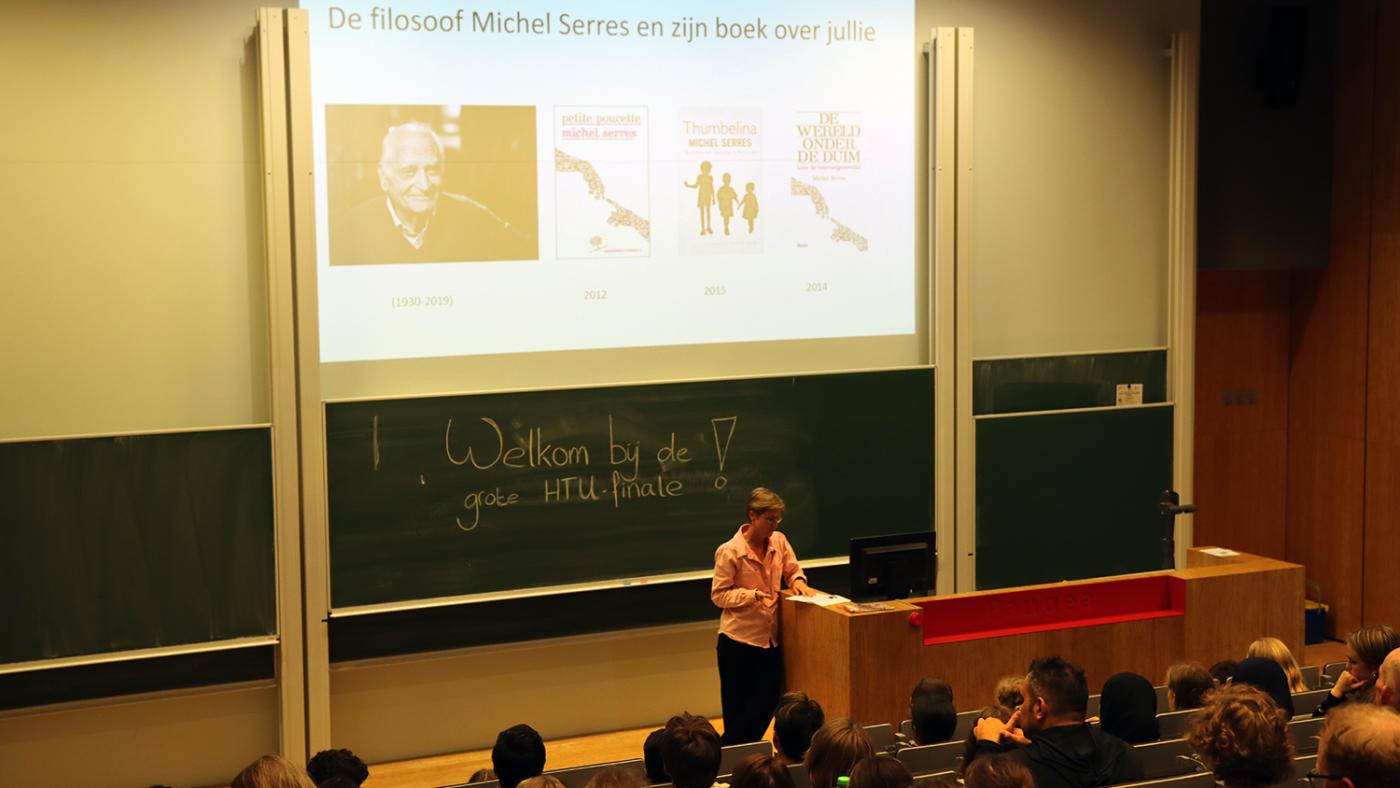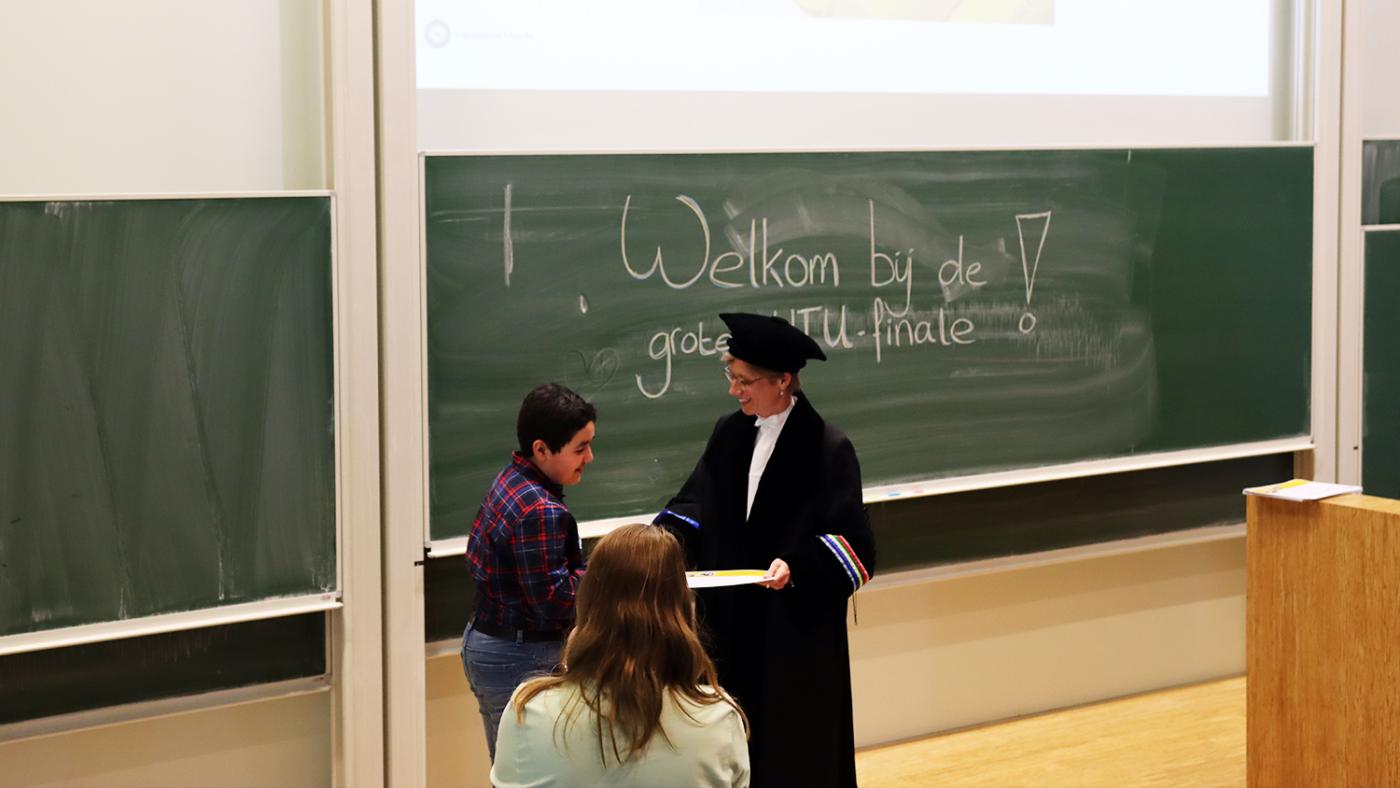HTU: Secondary school students at UU
‘It really feels like an honour to join in’

The sixty secondary school pupils who participated in Honours Trajectum Utrecht (HTU) last year proudly presented their research results in pairs or triplets with large posters and presentations. The audience was mostly comprised of parents and teachers. The group researched various topics, from how animals appear in hieroglyphics to what happens when ocean currents stop. "It was fascinating," said one of the HTU students after her presentation. The participants took the presentations very seriously and spoke about their research topics enthusiastically.
HTU is a cross-faculty programme offered by Utrecht University which provides supplementary education for second and third-grade secondary school pupils. In cooperation with eight affiliated schools in Utrecht, the programme offers inquisitive young people the chance to get acquainted with the university. Teachers ask motivated pupils if they want to participate in the programme. An HTU year is divided into three blocks of seven weeks. Students have classes every week, during which they read articles and conduct research under the guidance of teachers. Each block also includes a guest lecture and a field trip to a place that is part of the university, such as the Botanical Gardens or the University Medical Centre.

Photo: DUB
Each block is dedicated to one or more themes. This block's themes were "ocean currents" and "animals in literature". Students were divided into two groups, which attended classes related to these topics. These classes pay a lot of attention to the development of language skills: the mandatory readings highlight words that may not be immediately obvious, encouraging participants to work on their vocabulary. The pupils also talk a lot about newspapers and books, learning academic skills such as presenting, debating and researching.
There is one guest lecture per block. Saskia Stevens, Associate Professor of History of Antiquity & Ancient Culture, was one of the guest lecturers this time, talking to the group about Utrecht in Roman times. Following the theme "Peaks and Valleys", she descended through the Utrecht ground layers with the students until they arrived at the Roman layer. "A great thing about this group was that they weren’t afraid to ask questions," she says. They were well prepared for the guest lecture thanks to several readings on the subject, which was also discussed in class. "They made different associations with the Romans than my students, which led to original questions."
"I felt like learning new things"
Ratiba participated in the first edition of Honours Trajectum Utrecht (HTU) in 2017. She is now a second-year Information Science student at UU. Last year, she worked as a student assistant at HTU. She says she was introduced to the programme in her second year of high school at Sint Gregorius College. She was transferred to HTU from a talent programme she took in primary school and the first year of secondary school. "I felt like learning new things and HTU was the perfect opportunity for that."
She didn't know she wanted to study Information Science until her sixth year in secondary school, but the guest lectures helped her figure out what she didn't want. "I remember we had a guest lecture by a philosopher and how annoying I thought he was, with all those rhetorical questions," she remembers, laughing. "Later, I understood how extraordinary it was to attend such a lecture as a secondary school pupil."

Ratiba. Photo: DUB
Ratiba admits that, at the time, she sometimes felt as though the university wasn’t for her. "When I arrived at the university, the first thing I noticed was the lack of diversity in the student population. I come from a different cultural background myself, which made me even more aware of this homogeneity," she recollects. Nevertheless, she enjoys studying Information Science at UU. "It's still not very diverse but things are improving, based on the classes I take."
Ratiba was already planning to go to university anyway, but HTU made sure she stayed at UU. "I have had a relationship with UU since my second year of secondary school. I feel comfortable here." She’s the first person in her family to go to college. Her parents have always supported her. "They went to so many open days with me, not all kids are that lucky." She does note, however, that many of her classmates felt as though it didn't make sense to go to university.

Photo: DUB
"It feels like an honour to join in"
HTU was set up to increase "equity and upward socioeconomic mobility". It is meant for pupils "for whom university is not an obvious next step, given their sociocultural or economic background." For instance, there are relatively many participants whose parents are not Dutch and/or whose parents did not go to university.
Classes and guest lectures take place at a university building on Kromme Nieuwegracht one week, and online the next, which means that participants are frequently in touch with the university, its lecturers, students, and the general atmosphere. Ratiba says this inspired her. After all, experiencing all of this up close makes it less daunting to join the university yourself.
One of the reasons why she likes the programme so much is that "participants, including those with language deficiencies, never feel dumb." According to her, whereas taking tutoring often gives the idea of falling behind, this programme succeeds in getting young people to improve their language skills without explicitly naming it. "It really feels like an honour to be allowed to join in," Ratiba says. She also sees that enthusiasm in today's students. Consequently, she is "quite sure that the programme is succeeding" in its equity goals.
Iris van der Tuin, Vice-Dean of the Faculty of Humanities and ultimately responsible for HTU, was also present at the final presentations. Wearing a gown, she gave participants their diplomas, which came in a UU sleeve and an alumni bag. She had spent half a day shadowing the classes in preparation, and emphasised how much UU teachers can also learn from HTU. "We can learn from how the programme engages students, with an eye on inclusion and diversity. By playfully introducing students to books, papers and interdisciplinary themes, it emphasises the competences they already have and what they can build on. The final presentations show that browsing eventually gives way to a scientific attitude." The method HTU chooses is in line with this generation of secondary school students, but also contributes to diversity, says Van der Tuin.

Iris van der Tuin, vice dean of the Faculty of Humanities. Photo: DUB
"I would recommend it to anyone"
This past year, Ratiba has been working as a student assistant at the programme. She decided to do so because of her own experience with the programme and the need to increase diversity at the university. She oriented participants in their research and arranged the online classes. "I would recommend it to anyone," she says. "It's fun to see how they all motivate each other in their own way. Those who love presenting exchange their enthusiasm with the students who love reading. I was the one who didn't like reading books, but I was quite an extrovert," Ratiba says. She is enthusiastic about the participants and the research they have done. Because of her own experience as an HTU student, she knows how to interact with the students. "I know how to ask questions. I ask very thorough questions and don't settle for just 'yes' or 'no'."
Ratiba is still reaping the benefits of her time as an HTU student. "What has stuck with me most from the classes is answering questions confidently and daring to make a presentation. I still use the skills I learned then in my studies today. Whether it's presenting in front of a large crowd or communicating my ideas effectively, HTU's classes have given me a strong foundation that is still valuable today."